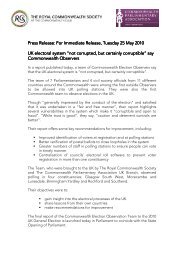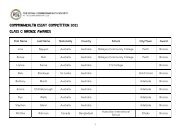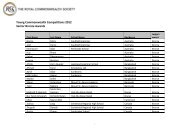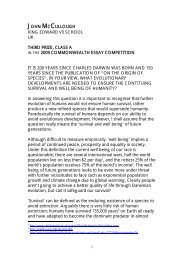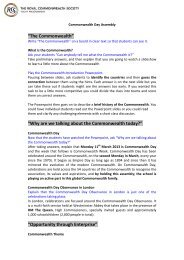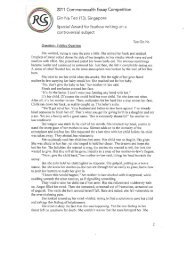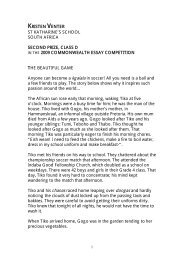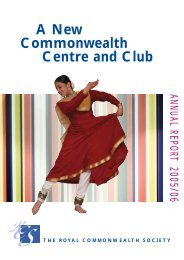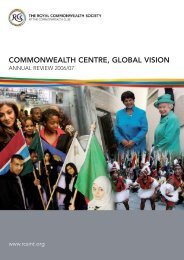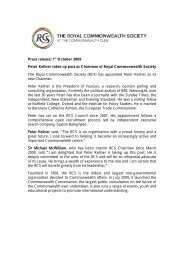Annual Review 2007-2008 - The Royal Commonwealth Society
Annual Review 2007-2008 - The Royal Commonwealth Society
Annual Review 2007-2008 - The Royal Commonwealth Society
You also want an ePaper? Increase the reach of your titles
YUMPU automatically turns print PDFs into web optimized ePapers that Google loves.
Building on the past,<br />
creating the future<br />
RCS 1868–<strong>2008</strong>: Celebrating the 140th anniversary<br />
great want has often been felt by gentleman connected with our several colonies for<br />
‘A some meeting place, some centre of attraction where they might resort on their arrival,<br />
and where they might obtain the latest intelligence from their own part of the world, and place<br />
themselves in communication with other gentlemen connected with their own and other<br />
colonies, and with them concert such measures as should tend to the interest of all.’<br />
So declared Viscount Bury upon the formal creation of a colonial society in 1868. 1<br />
<strong>The</strong> idea of a colonial institution had<br />
been pitched a year earlier, over dinner in<br />
London, by the prominent Australian, Sir<br />
Charles Nicholson. However, the<br />
proposal was not formally taken up until<br />
the following year when A R Roche,<br />
Hugh E Montgomerie and Viscount<br />
Bury called a meeting by public<br />
advertisement to consider the<br />
formation of a colonial society. At the<br />
meeting, held on Friday 26 June 1868<br />
at Willis’s Rooms in King Street, St<br />
James, Bury was voted into the chair<br />
and the meeting’s motion<br />
unanimously approved.<br />
In June 1869, with the approval<br />
of the Queen, the <strong>Society</strong> received<br />
its first Charter and became known<br />
as the <strong>Royal</strong> Colonial <strong>Society</strong>. This<br />
title was altered to the <strong>Royal</strong><br />
Colonial Institute in 1870<br />
following complaints that the<br />
initials could be confused with those of<br />
the <strong>Royal</strong> College of Surgeons. 2<br />
An astonishing evolution<br />
In 1968, the organisation celebrated its<br />
centenary. RCS records show that 1,181<br />
people who were members in 1968<br />
remain members today. This remarkable<br />
figure evidences the continuing<br />
attachment to the RCS felt by many. It is a<br />
loyalty which has remained throughout a<br />
truly astonishing evolution from the<br />
founding of the Colonial <strong>Society</strong> of 1868<br />
to the <strong>Royal</strong> <strong>Commonwealth</strong> <strong>Society</strong> of<br />
today.<br />
<strong>2008</strong> marks the one hundred and<br />
fortieth anniversary of the RCS. This<br />
significant milestone will be celebrated by<br />
a range of events and projects to be held<br />
Doctoral Student Ruth Craggs writes:<br />
1 Reese, T.R. (1968) <strong>The</strong> History of the <strong>Royal</strong> <strong>Commonwealth</strong> <strong>Society</strong>, Oxford University Press, London. (p. 14)<br />
2 Reese, T.R. (1968) <strong>The</strong> History of the <strong>Royal</strong> <strong>Commonwealth</strong> <strong>Society</strong>, Oxford University Press, London.<br />
over the course of the<br />
year, under the theme<br />
‘Building on the past,<br />
creating the future’.<br />
<strong>The</strong>y will include the<br />
<strong>Annual</strong> General<br />
Meeting which will, this<br />
year, be held on the<br />
anniversary of the<br />
<strong>Society</strong>’s formation, 26<br />
June, and will be followed<br />
by a champagne reception<br />
and ‘birthday’ cake. 16–30<br />
June will also see an<br />
exciting photographic<br />
exhibition in the gallery<br />
space of the Club which will<br />
display images spanning the<br />
evolution of the RCS.<br />
<strong>The</strong> <strong>Royal</strong> <strong>Commonwealth</strong><br />
<strong>Society</strong> Library (1928)<br />
My research (Geography Department, University of Nottingham) is concerned with the<br />
evolution, in the three decades following World War II, of ideas about the modern<br />
<strong>Commonwealth</strong>. My research uses the <strong>Royal</strong> <strong>Commonwealth</strong> <strong>Society</strong> as a site through<br />
which to understand the debates over what the <strong>Commonwealth</strong> could and should be<br />
in the future. By looking at the lectures and events held at the <strong>Society</strong>, as well as the<br />
travels of members of staff, I follow the evolution from imperial visions to those<br />
embracing diversity and difference, although my work also reveals some continuity<br />
between past and present visions, often in unexpected places. My work has involved<br />
extensive use of the RCS archives in Cambridge University Library, alongside oral<br />
history interviews. I have drawn both on material published by the <strong>Society</strong> (for<br />
example United Empire and the <strong>Commonwealth</strong> Journal) and unpublished papers.<br />
Records of committee meetings, accounts of trips abroad and photographs of events<br />
at the headquarters provide a rich record of the <strong>Society</strong>’s history, and, through that, of<br />
the evolution of ideas of <strong>Commonwealth</strong> itself. Though it has often been dusty, dirty,<br />
and painstaking work it has also been intriguing and compelling, revealing the myriad<br />
of characters, ideas and spaces involved in imagining a modern <strong>Commonwealth</strong>.<br />
www.rcsint.org<br />
7



